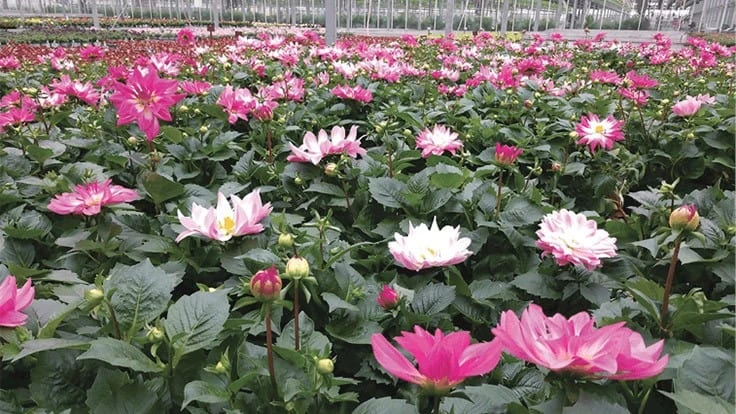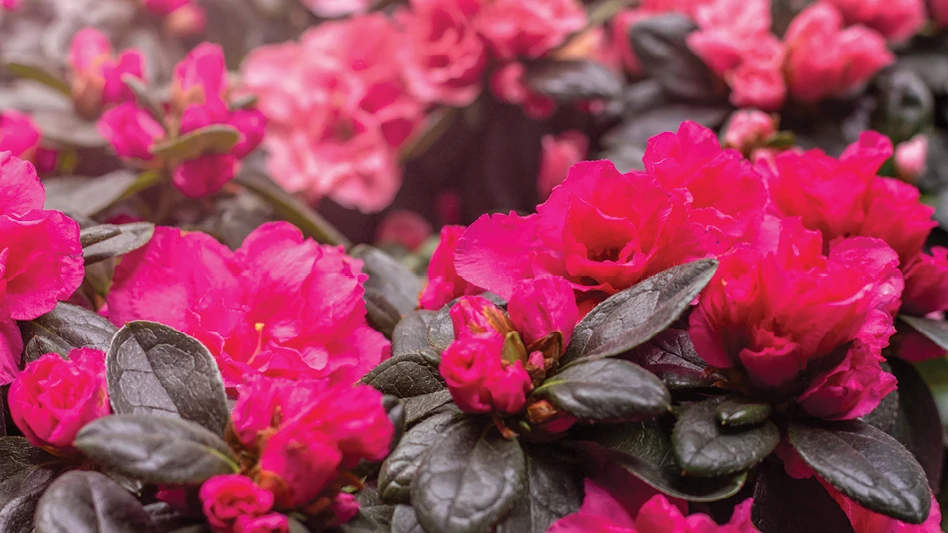

Garden State Growers, located in Pittstown, New Jersey, primarily sells annuals and perennials to big-box stores such as Lowe’s and Home Depot, but also sells to independent garden centers and supermarket chains in the area. The operation is a mix of greenhouse space (about 27 acres) and outdoor production (about 158 acres), allowing it to produce plants for customers at scale year-round.
According to Alex Zubko, one of the lead growers at Garden State, producing plants at scale can sometimes be easier than producing small-batch orders.
“From a production standpoint, it’s not so much different,” he says. “It’s sometimes a little bit easier because we have huge blocks of stuff, so it’s easier to treat [the plants] when you have a whole house or a whole table or a whole row of something vs. small batches of stuff scattered around. That can be a little crazy.”
Zubko, who joined the operation two years ago, previously worked at the Rutgers University research farm. For him, working at a commercial operation vs. a research setting has led to more fulfilling work.
“It’s more so seeing the end product,” he says. “At Rutgers, I was working on small batch research stuff and you never got to see what you applied. Most of it went into research. When you go to a big operation like this in the private sector, you actually get to use what you’re learning and what you know.”

Establishing strong roots
At Garden State, one of the main products Zubko relies on is Obtego®, a fungicide and plant symbiont from SePRO. Previously, he says, the growing team was using another product that was more expensive for the same benefit. So, they made the switch.
“We used that product on everything, but the cost was too much,” Zubko says. “But we really liked the idea of incorporating something that gives us that symbiotic relationship with the soil and the plant. We drench all our products with Obtego® now and you see a big difference.”
According to Zubko, what Garden State likes most about Obtego® is that it is designed not only help root growth, but also protect the plants from soil-borne pathogens. When the operation is prepping its biggest orders for its customers, those types of pathogens are one of the top risks for a successful growing cycle.
“The plants are healthier,” he says. “And the root systems are definitely bulked up a little bit. As soon as it goes to transplant, you see the roots will take off a lot quicker. When you have a weak root system coming out of propagation, it’s going to take a while to build. It’s a lot easier to build that at propagation.”
Zubko says drenching the plugs can be done one of two ways. The first is by using the boom system that is normally used for irrigation. In that format, Obtego® is dispersed as a heavy mist. The second option is to use it as a tank mix and have it soak into the plants and into the plug trays.
“Both are really effective methods,” he says. “Using the boom is a bit easier, and less labor intensive, but you can’t really go wrong.”

Finding solutions
Another SePRO product Garden State uses is Rycar®, an insecticide that can be used to treat all biotypes of whiteflies, aphids, mealybugs, chilli thrips and leafhoppers.
“We’ve had great response on chilli thrips with Rycar®," Zubko says. "We've been using it for a couple of years now." He says one sign that Rycar® is working is that after they spray, they see chilli thrips «pop up» with the spraying knocking them down “pretty quick.”
“You won’t see them on the sticky cards; you won’t see them when you pat on paper or anywhere else,” he says. Recently, it was used to treat a chilli thrips issue on a large area of New Guinea impatiens and is mostly used as it is needed.
“Things like chilli thrips and even aphids, they can get out of hand pretty quick if you can’t catch them,” he says. “You’re talking about having populations double, triple in three, four, five days sometimes. If you aren’t on top of your stuff, and don’t take the time to scout and look, it gets out of control pretty quickly.” Zubko adds that Topflor®, a plant growth regulator (PGR) from SePRO, is also used from time to time by himself and other growers.
Overall, the portfolio of SePRO products Garden State uses year-round is something that business has come to rely on. The spray frequency crops are different — lavender is once a week, while others are every week, according to Zubko. But the point of using the products is the same: They provide a solution.
It's a reassurance — it’s something that we believe in because it works and it should be applied,” Zubko says. “It’s always a battle, so it’s worth the time and investment.”
Obtego and Topflor are registered trademarks of SePRO Corporation. Rycar is a registered trademark of Nichino America, Inc.
Get curated news on YOUR industry.
Enter your email to receive our newsletters.

Explore the July 2020 Issue
Check out more from this issue and find your next story to read.
Latest from Greenhouse Management
- Growing enlightened
- American Floral Endowment awards 17 organizations $60,700 in educational grants
- Floral businesses invited to join Society of American Florists' Petal It Forward event in October
- Bioline AgroSciences acquires Viridaxis to strengthen leadership in aphids biocontrol
- Ryley Leech joins JumpLights as vice president of sales
- Meet the Retailers' Choice Awards from 2025 Farwest Show
- Added value
- National Garden Bureau announces featured crops for 2026 'Year of the' program






